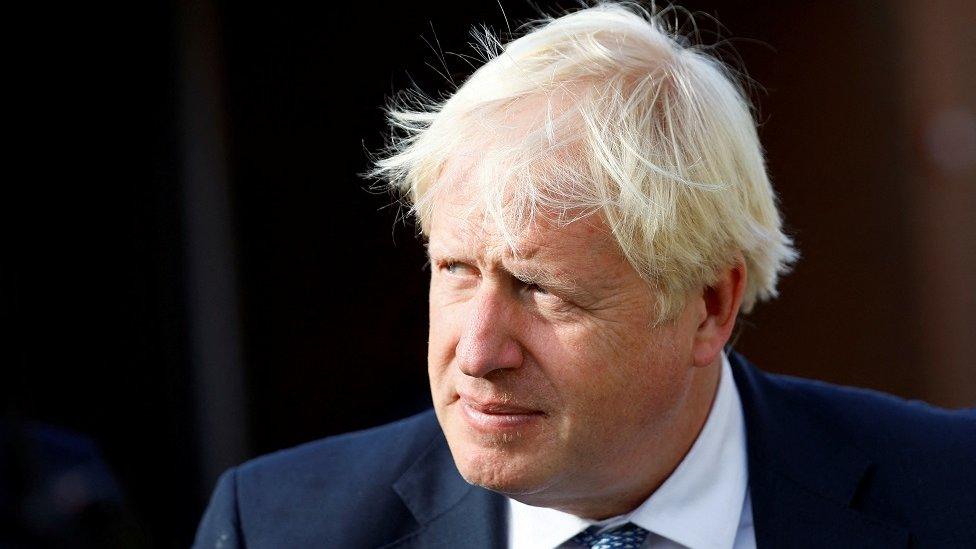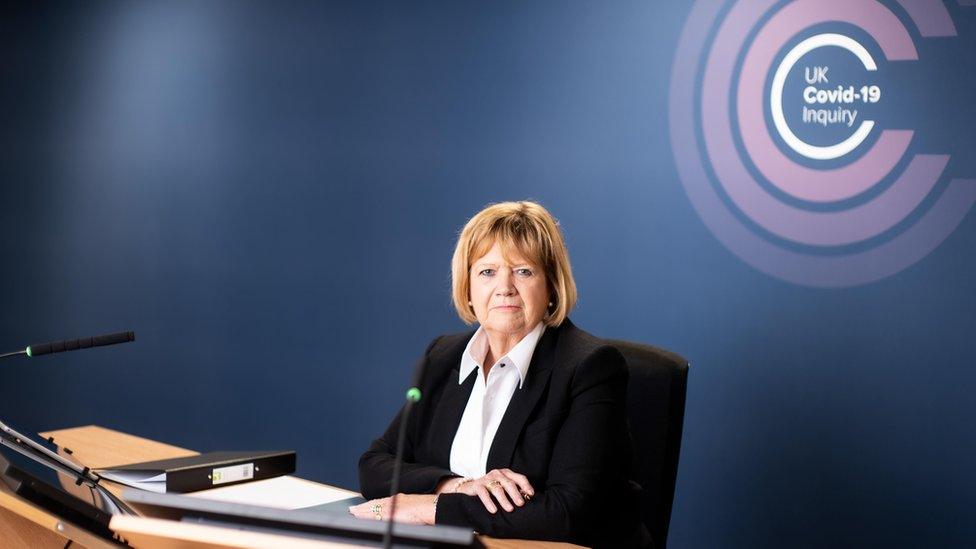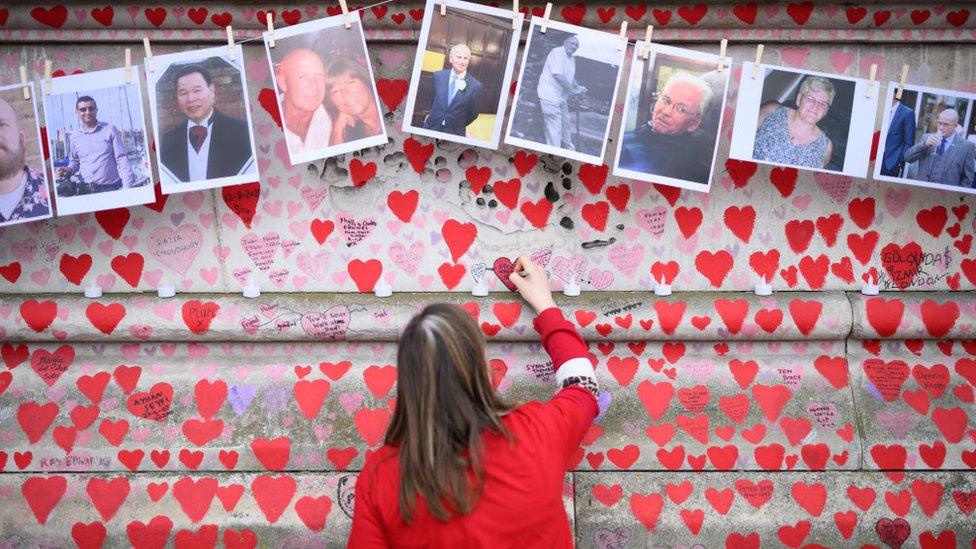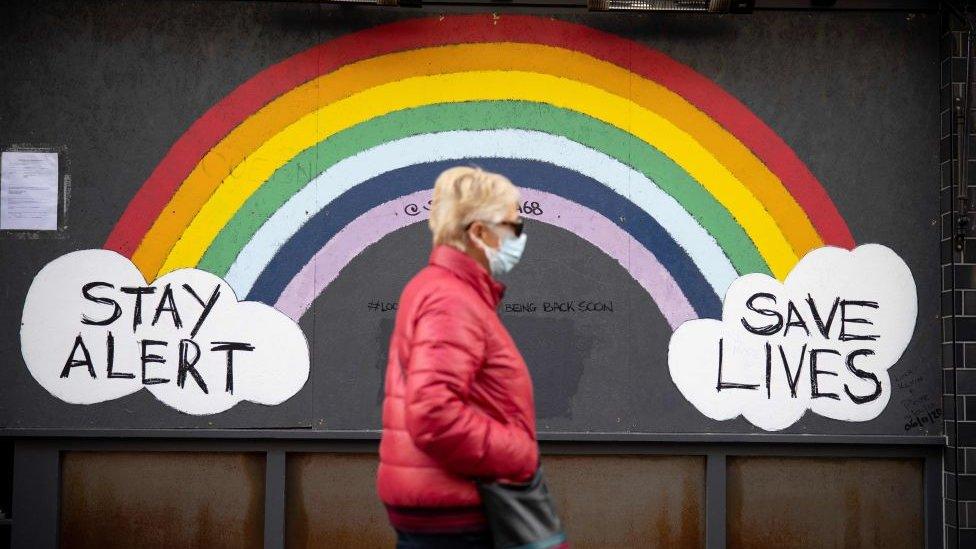High Court battle over Boris Johnson's Covid WhatsApps
- Published

The government's legal challenge to the Covid inquiry's demand to see Boris Johnson's diaries and WhatsApps in full has been heard in the High Court.
The Cabinet Office rejected the demand, arguing it should not have to hand over material it does not consider relevant.
Covid inquiry chair Baroness Hallett says it should be up to her decide what is relevant.
The government took the unprecedented step of bringing a judicial review of Baroness Hallett's order.
It is the first time a government has mounted a legal challenge to an inquiry it set up itself.
A ruling from the hearing, before Lord Justice Dingemans and Mr Justice Garnham, will be given at a later date.
The material sought by the inquiry includes WhatsApp messages on Mr Johnson's devices from a group chat set up to discuss the pandemic response.
'Considerable reluctance'
It has also asked to see WhatsApp messages he exchanged with a host of politicians, including his successor Rishi Sunak, as well as various civil servants, including the UK's top civil servant Simon Case.
At a High Court hearing on Friday, the Cabinet Office's lawyer Sir James Eadie KC said the government had brought the case with "considerable reluctance".
The barrister said that the "broad" demand for evidence sought by Baroness Hallett had caught a "substantial amount of irrelevant material," including messages of a personal nature and material irrelevant to the inquiry.
This, he added, had led to a "real concern about privacy interests".
The legislation setting out the inquiry's powers to demand evidence does not provide it with "open-ended discretion," he argued.

Baroness Hallett is chairing the Covid inquiry
Representing the inquiry, Hugo Keith KC said Baroness Hallett's call for documents was "entirely regular" and fell "firmly within" its legal powers to demand evidence.
Opening his submissions, he said the powers allowed her to "cast her net suitably broadly" to ensure a "thorough investigation".
"Until the order is made and the material is provided, the chair cannot know what will possibly turn out to be relevant," he told the court.
He added that for the Cabinet Office to decide what is relevant would be allowing the department to "mark its own homework," and would "emasculate this and future inquiries".
Boris Johnson has handed over WhatsApp messages, diaries and personal notebooks to the Cabinet Office in unredacted form.
In a statement to the court before the hearing, senior civil servant Ellie Nicholson said the Cabinet Office was reviewing the material "for national security sensitivities and unambiguously irrelevant material, and appropriate redactions are being applied".
'More than happy'
But the former PM's WhatsApp messages cover the period only after May 2021, meaning they would be of limited use to the inquiry, which is looking at decisions made during the pandemic.
This was due to a "well-publicised security breach", wrote Ms Nicholson.
Mr Johnson was forced to change his mobile phone in 2021 after it emerged his number had been publicly available online for 15 years.
The former prime minister wrote to the inquiry after the Cabinet Office launched the judicial review, saying he was "more than happy" to hand over his unredacted WhatsApp messages and notebooks directly to the inquiry.
He is believed to have written to the Cabinet Office to ask whether security and technical support can be given to help retrieve the content on the device without compromising security.
At the High Court hearing, his lawyer Lord Pannick KC said Mr Johnson supported the position of the inquiry.
He added that the inquiry wanted to see unredacted material so that it could decide whether it meets its remit, but it would not be able to "form its own judgment" until it has seen it itself.
Related topics
- Published6 June 2023

- Published2 June 2023

